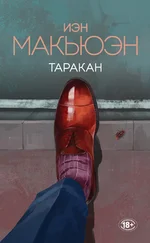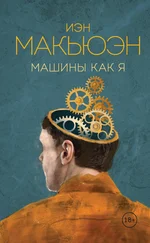My portfolio had halved in value. I was supposed to be recouping losses. But the thought of her next door was a distraction. As so often in the mornings, I dwelt on our night before. The misery enveloping the country had made it all the more intense. Then we had talked. She described at length her childhood, an idyll shattered by her mother’s death when she was eight. She wanted to take me to Salisbury and show me the important locations. I took this as a sign of progress but she had yet to suggest a date, and she hadn’t said that she wanted me to meet her father.
I was facing my screen without seeing it. The walls and especially the door were thin. She was making very slow progress. At long intervals, I made out a deliberate click as she registered a choice. The silence between made me tense. Open to experience? Conscientious? Emotionally stable? After an hour I was getting nowhere and decided to go out. I kissed the top of her head as I squeezed past her chair. I left the house and set off towards Clapham.
It was unusually hot for April. The traffic down Clapham High Street was heavy, the pavements were crowded. Everywhere, black ribbons. The idea had crossed from the United States. On lamp posts and doors, in shop windows, on car door handles and aerials, on pushchairs, wheelchairs and bikes. In central London, on official buildings where Union Jacks were at half mast, black ribbons dangled from the flag poles for the 2,920 dead. Black ribbons were worn as armbands and on lapels – I was wearing one myself and so was Miranda. I would find one for Adam. Women and girls and flamboyant men tied them in their hair. The passionate minority who had argued and marched against the invasion wore them too. For public figures, and celebrities, including the royal family, it was hazardous not to wear one – the popular press was keeping watch.
I had no ambition but to walk off my restless state. I increased my pace through the business end of the High Street. I passed the boarded-up office of the Anglo-Argentinian Friendship Society. A rubbish collectors’ walkout was in its second week. The bags piled round lamp posts were waist-high and the heat was generating a sweet stench. The public, or its press, agreed with the prime minister, that a strike at such a time was an act of heartless disloyalty. But the wage demands were as inevitable as the next rise in inflation. No one knew yet how to dissuade the snake from eating its tail. Very soon, perhaps by the end of the year, stoical robots of negligible intelligence would be picking up the rubbish. The men they displaced would be even poorer. Unemployment was at sixteen per cent.
By the curry house and along the greasy pavement outside the fast-food chains, the smell of rotting meat was a force that hit the chest. I held my breath until I was past the Tube station. I crossed the road and walked onto the Common. There were shouts and squeals rising from a crowd by the boating and paddling pool. Even some of the kids splashing about were wearing ribbons. It was a happy scene but I didn’t linger. In these new times a solitary man had to be wary of seeming to stare at children.
So I strolled over to Holy Trinity Church, a huge brick Age of Reason shed. There was no one inside. As I sat, hunched forward, elbows on knees, I could have been mistaken for a worshipper. It was too reasonable a place to evoke much awe, but its clean lines and sensible proportions were soothing. I was content to stay a while in the cool gloom and let my thoughts drift back to our very first night together when I’d been woken by a prolonged howl. I thought a dog was in the room and I was half out of bed before I came to and realised that Miranda was having a nightmare. It wasn’t easy to wake her. She was struggling, as if fighting with someone, and twice she mumbled, ‘Don’t go in. Please.’ Afterwards, I thought it would help her to describe the dream. She was lying on my arm, clinging to me tightly. When I asked her again, she shook her head, and soon she was asleep.
In the morning, over coffee, she shrugged my question away. Just a dream. That moment of evasion stood out because Adam was behind us, making a good job of cleaning the window, which I had told him, rather than asked him, to do. While we were talking, he had paused and turned, as if intrigued to hear an account of a nightmare. I wondered then if he himself was subject to dreams. He was on my conscience now. My command that morning had been snappish. I shouldn’t have treated him like a servant. Later that day I had powered him down. I had left him switched off too long. Holy Trinity Church was associated with William Wilberforce and the anti-slavery movement. He would have promoted the cause of the Adams and Eves, their right not to be bought and sold and destroyed, their dignity in self-determination. Perhaps they could take care of themselves. Soon, they’d be doing the dustmen’s jobs. Doctors and lawyers were next in line. Pattern recognition and faultless memory were even easier to compute than gathering up the city’s filth.
We could become slaves of time without purpose. Then what? A general renaissance, a liberation into love, friendship and philosophy, art and science, nature worship, sports and hobbies, invention and the pursuit of meaning? But genteel recreations wouldn’t be for everyone. Violent crime had its attractions too, so did bare-knuckle cage-fighting, VR pornography, gambling, drink and drugs, even boredom and depression. We wouldn’t be in control of our choices. I was proof of that.
I wandered out across the open spaces of the Common. Fifteen minutes later I reached the far side and decided to turn back. By now, Miranda should have made at least a third of her decisions. I was impatient to be with her before she set off for Salisbury. She would be back late that night. I was resting from the heat in the narrow shade of a silver birch. A few yards away was a fenced-in little swing park for children. A small boy – I guessed he was about four years old – dressed in baggy green shorts, plastic sandals and a stained white t-shirt, was bent over by a see-saw examining an object on the ground. He tried to dislodge it with his foot, then he crouched down and got his fingers to it.
I hadn’t noticed his mother sitting on a bench with her back to me. She called out sharply, ‘Get here!’
The boy looked up, seemed about to go towards her, then his attention returned to the interesting thing on the ground. Now he had moved, I saw it myself. It was a bottle top, glinting dully, perhaps embedded in the softened tarmac.
The woman’s back was broad, her hair black, curly, thinning towards the crown. In her right hand was a cigarette. Her elbow was cupped in her left hand. Despite the heat, she was wearing a coat. Below the collar was a long tear.
‘D’you hear me?’ The threat was on a rising note. Again, the child looked up and seemed fearful and bound to obey. He took a half-step but, as his gaze shifted, he saw his prize again and faltered. When he went back to it, he may have thought he could lever it free and take it to his mother. But what he may have reasoned didn’t matter. With a yelp of frustration, the woman leaped from the bench, crossed the few yards of playground at speed and dropped her cigarette as she grabbed the boy by his arm and smacked his bare legs. At the instant of his first cry, she smacked him again, and a third time.
I’d been comfortable in my thoughts and was reluctant to be taken from them. For a moment I thought I could head for home, pretending, if not to myself then to the world, that I’d seen nothing. There was nothing I could do about this little boy’s life.
His screams were angering his mother further. ‘Shut up!’ she shouted at him over and over again. ‘Shut up! Shut up!’
Even then, I might have forced myself to ignore the scene. But as the boy’s shrieks grew louder, she seized his shoulders in two hands, pulling his dirty t-shirt clear of his belly, and began to shake him hard.
Читать дальше
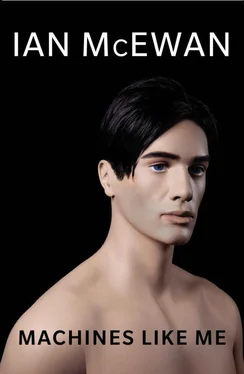






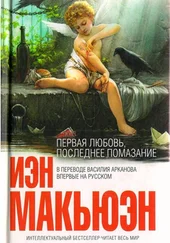
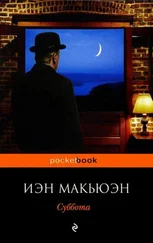

![Иэн Макьюэн - Таракан [litres]](/books/435106/ien-makyuen-tarakan-litres-thumb.webp)
